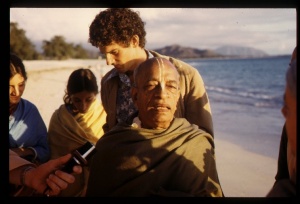SB 7.7.50: Difference between revisions
m (1 revision(s)) |
(Vanibot #0054 edit - transform synonyms into clickable links, which search similar occurrences) |
||
| (One intermediate revision by one other user not shown) | |||
| Line 1: | Line 1: | ||
{{info | {{info | ||
|speaker= | |speaker=Prahlāda Mahārāja | ||
|listener= | |listener=Prahlāda Mahārāja's school friends | ||
}} | }} | ||
[[Category:Srimad-Bhagavatam - Canto 07 Chapter 07]] | |||
[[Category:Bhagavatam Verses Spoken by Prahlada Maharaja - Vanisource|070750]] | |||
<div style="float:left">'''[[Srimad-Bhagavatam]] - [[SB 7|Seventh Canto]] - [[SB 7.7: What Prahlada Learned in the Womb|Chapter 7: What Prahlāda Learned in the Womb]]'''</div> | |||
<div style="float:right">[[File:Go-previous.png|link=SB 7.7.49]] '''[[SB 7.7.49]] - [[SB 7.7.51-52]]''' [[File:Go-next.png|link=SB 7.7.51-52]]</div> | |||
{{RandomImage}} | |||
==== TEXT 50 ==== | ==== TEXT 50 ==== | ||
<div | <div class="verse"> | ||
devo 'suro manuṣyo vā | :devo 'suro manuṣyo vā | ||
yakṣo gandharva eva vā | :yakṣo gandharva eva vā | ||
bhajan mukunda-caraṇaṁ | :bhajan mukunda-caraṇaṁ | ||
svastimān syād yathā vayam | :svastimān syād yathā vayam | ||
</div> | </div> | ||
| Line 17: | Line 22: | ||
==== SYNONYMS ==== | ==== SYNONYMS ==== | ||
<div | <div class="synonyms"> | ||
''[//vanipedia.org/wiki/Special:VaniSearch?s=devaḥ&tab=syno_o&ds=1 devaḥ]'' — a demigod; ''[//vanipedia.org/wiki/Special:VaniSearch?s=asuraḥ&tab=syno_o&ds=1 asuraḥ]'' — a demon; ''[//vanipedia.org/wiki/Special:VaniSearch?s=manuṣyaḥ&tab=syno_o&ds=1 manuṣyaḥ]'' — a human being; ''[//vanipedia.org/wiki/Special:VaniSearch?s=vā&tab=syno_o&ds=1 vā]'' — or; ''[//vanipedia.org/wiki/Special:VaniSearch?s=yakṣaḥ&tab=syno_o&ds=1 yakṣaḥ]'' — a Yakṣa (a member of a demoniac species); ''[//vanipedia.org/wiki/Special:VaniSearch?s=gandharvaḥ&tab=syno_o&ds=1 gandharvaḥ]'' — a Gandharva; ''[//vanipedia.org/wiki/Special:VaniSearch?s=eva&tab=syno_o&ds=1 eva]'' — indeed; ''[//vanipedia.org/wiki/Special:VaniSearch?s=vā&tab=syno_o&ds=1 vā]'' — or; ''[//vanipedia.org/wiki/Special:VaniSearch?s=bhajan&tab=syno_o&ds=1 bhajan]'' — rendering service; ''[//vanipedia.org/wiki/Special:VaniSearch?s=mukunda&tab=syno_o&ds=1 mukunda]-[//vanipedia.org/wiki/Special:VaniSearch?s=caraṇam&tab=syno_o&ds=1 caraṇam]'' — to the lotus feet of Mukunda, Lord Kṛṣṇa, who can give liberation; ''[//vanipedia.org/wiki/Special:VaniSearch?s=svasti&tab=syno_o&ds=1 svasti]-[//vanipedia.org/wiki/Special:VaniSearch?s=mān&tab=syno_o&ds=1 mān]'' — full of all auspiciousness; ''[//vanipedia.org/wiki/Special:VaniSearch?s=syāt&tab=syno_o&ds=1 syāt]'' — becomes; ''[//vanipedia.org/wiki/Special:VaniSearch?s=yathā&tab=syno_o&ds=1 yathā]'' — just as; ''[//vanipedia.org/wiki/Special:VaniSearch?s=vayam&tab=syno_o&ds=1 vayam]'' — we (Prahlāda Mahārāja). | |||
</div> | </div> | ||
| Line 24: | Line 29: | ||
==== TRANSLATION ==== | ==== TRANSLATION ==== | ||
<div | <div class="translation"> | ||
If a demigod, demon, human being, Yakṣa, Gandharva or anyone within this universe renders service to the lotus feet of Mukunda, who can deliver liberation, he is actually situated in the most auspicious condition of life, exactly like us [the mahājanas, headed by Prahlāda Mahārāja]. | If a demigod, demon, human being, Yakṣa, Gandharva or anyone within this universe renders service to the lotus feet of Mukunda, who can deliver liberation, he is actually situated in the most auspicious condition of life, exactly like us [the mahājanas, headed by Prahlāda Mahārāja]. | ||
</div> | </div> | ||
| Line 31: | Line 36: | ||
==== PURPORT ==== | ==== PURPORT ==== | ||
<div | <div class="purport"> | ||
Prahlāda Mahārāja, by his living example, requested his friends to engage in devotional service. Whether in demigod society, asura society, human society or Gandharva society, every living entity should take shelter of the lotus feet of Mukunda and thus become perfect in good fortune. | Prahlāda Mahārāja, by his living example, requested his friends to engage in devotional service. Whether in demigod society, ''asura'' society, human society or Gandharva society, every living entity should take shelter of the lotus feet of Mukunda and thus become perfect in good fortune. | ||
</div> | </div> | ||
__NOTOC__ | |||
<div style="float:right; clear:both;">[[File:Go-previous.png|link=SB 7.7.49]] '''[[SB 7.7.49]] - [[SB 7.7.51-52]]''' [[File:Go-next.png|link=SB 7.7.51-52]]</div> | |||
__NOTOC__ | |||
__NOEDITSECTION__ | |||
Latest revision as of 23:06, 18 February 2024

A.C. Bhaktivedanta Swami Prabhupada
TEXT 50
- devo 'suro manuṣyo vā
- yakṣo gandharva eva vā
- bhajan mukunda-caraṇaṁ
- svastimān syād yathā vayam
SYNONYMS
devaḥ — a demigod; asuraḥ — a demon; manuṣyaḥ — a human being; vā — or; yakṣaḥ — a Yakṣa (a member of a demoniac species); gandharvaḥ — a Gandharva; eva — indeed; vā — or; bhajan — rendering service; mukunda-caraṇam — to the lotus feet of Mukunda, Lord Kṛṣṇa, who can give liberation; svasti-mān — full of all auspiciousness; syāt — becomes; yathā — just as; vayam — we (Prahlāda Mahārāja).
TRANSLATION
If a demigod, demon, human being, Yakṣa, Gandharva or anyone within this universe renders service to the lotus feet of Mukunda, who can deliver liberation, he is actually situated in the most auspicious condition of life, exactly like us [the mahājanas, headed by Prahlāda Mahārāja].
PURPORT
Prahlāda Mahārāja, by his living example, requested his friends to engage in devotional service. Whether in demigod society, asura society, human society or Gandharva society, every living entity should take shelter of the lotus feet of Mukunda and thus become perfect in good fortune.